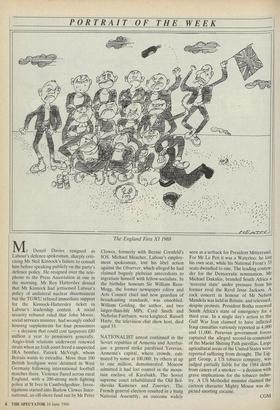PORTRAIT OF THE WEEK
The England First XI 1988 Mr Denzil Davies resigned as Labour's defence spokesman, sharply criti- cising Mr Neil Kinnock's failure to consult him before speaking publicly on the party's defence policy. He resigned over the tele- phone to the Press Association at one in the morning. Mr Roy Hattersley denied that Mr Kinnock had jettisoned Labour's policy of unilateral nuclear disarmament but the TGWU refused immediate support for the Kinnock-Hattersley ticket in Labour's leadership contest. A social security tribunal ruled that John Moore, social services minister, had wrongly ended housing supplements for four pensioners — a decision that could cost taxpayers £80 million a year to pensioners generally. Anglo-Irish relations underwent renewed strain when an Irish court freed a suspected IRA bomber, Patrick McVeigh, whom Britain wants to extradite. More than 100 British hooligans were detained in West Germany following international football matches there. Violence flared across rural England, with a 200-strong mob fighting police at St Ives in Cambridgeshire. Inves- tigations started into Barlow Clowes Inter- national, an off-shore fund run by Mr Peter Clowes, formerly with Bernie Cornfeld's IOS. Michael Meacher, Labour's employ- ment spokesman, lost his libel action against the Observer, which alleged he had claimed bogusly plebeian antecedents to ingratiate himself with fellow-socialists. In the birthday honours Sir William Rees- Mogg, the former newspaper editor and Arts Council chief and now guardian of broadcasting standards, was ennobled. William Golding, the author, and two larger-than-life MPs, Cyril Smith and Nicholas Fairbairn, were knighted. Russell Harty, the television chat show host, died aged 53.
NATIONALIST unrest continued in the Soviet republics of Armenia and Azerbai- jan: a general strike paralysed Yerevan, Armenia's capital, where crowds, esti- mated by some at 100,000, by others at up to one million, demonstrated. Moscow admitted it had lost control in the moun- tain enclave of Karabakh. The Soviet supreme court rehabilitated the Old Bol- sheviks Kamenev and Zinoviev. The French general election resulted in a hung National Assembly, an outcome widely seen as a setback for President Mitterrand. For Mr Le Pen it was a Waterloo: he lost his own seat, while his National Front's 33 seats dwindled to one. The leading conten- der for the Democratic nomination, Mr Michael Dukakis, branded South Africa a `terrorist state' under pressure from his former rival the Revd Jesse Jackson. A rock concert in honour of Mr Nelson Mandela was held in Britain, and televised, despite protests. President Botha renewed South Africa's state of emergency for a third year. In a single day's action in the Gulf War Iran claimed to have inflicted Iraqi casualties variously reported as 4,000 and 11,000. Peruvian government forces captured the alleged second-in-command of the Maoist Shining Path guerillas. Large agricultural areas of the United States were reported suffering from drought. The Lig- gett Group, a US tobacco company, was judged partially liable for the 1984 death from cancer of a smoker — a decision with grave implications for the tobacco indus- try. A US Methodist minister claimed the cartoon character Mighty Mouse was de- picted snorting cocaine. CGM


















































 Previous page
Previous page